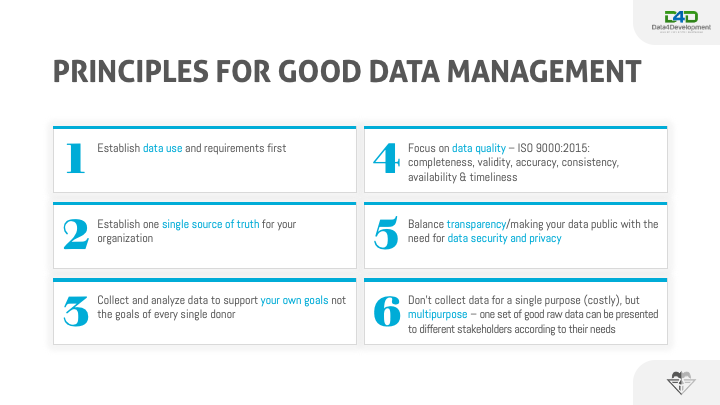Rethinking Data Management in Nonprofit work
Data, analytics, and algorithms are a few buzzwords that have taken the business world by storm in the last ten years. Enterprises have recognized the importance and usefulness of data in their daily work and integrated data management as a core competency to their operations. Yet, there seems to be an inertia among non-profit organizations to adopt a data-focused approach to their strategy and activities.
About 60% of nonprofit professionals don’t use any data in their decision-making process.
About 60% of nonprofit professionals don’t use any data in their decision-making process, according to a 2018 study by everyaction and nonprofithub. Interestingly, many are cognizant that their organizations collect data in some ways but aren’t sure about the purposes and extent of data collection and data analysis.
It seems that many NGOs think of the world of data management and data analytics as an enigmatic and overwhelming field. Many cited the lack of expertise, time or tools to fully embrace data management. However, NGOs don’t often realize that data has been a crucial part of their work for years. NGOs are working with data when fundraisers compile their donor mapping spreadsheets, or when project managers design measuring tools to keep track of their progress, or when MEL professionals report on the impact of their programming.
NGOs don’t often realize that data has been a crucial part of their work for years.
NGO professionals should not look at data analytics as another daunting advanced new technology and instead, as an updated iteration of accountability — situating data at the heart of every decision to inform fundraising strategy and ensure proper reporting and evaluation. Good data practices will enhance your position as a credible and responsible organization as they help build evidence for your work and prove your impact.
[democracy id=”2″]
Together with our partner Data4Development, we hosted a webinar on managing data for impact to break down data misconceptions and to provide simple tips for good data practices. NGOs can start with identifying sources of data available in their organization, such as website analytics, donor database, email contact lists, project and program outcomes and results, etc. From there, NGOs can assess the goals and objectives of every data point and focus on improving their data quality in their collection and analysis.

You can watch the hour-long webinar recording here or contact us at info@hanvalk.org to know more about how to best optimize your data management and collection processes.

An Ngo
A communicator by training and a consultant by trade, An joined the development sector after four years of experience in communications strategy, publication design and market research. He strives to help NGOs elevate their work and achieve their ambitions with his diversity of experiences and perspectives. An holds a Master Degree in Globalisation and Development Studies from Maastricht University.
stay up to date
We have at heart to be a resource to you. According to your preference, we will share insights, trainings, networking events and career opportunities that might be of interest for anyone from entry-level to seasoned professionals.
Contact
Phone
+31 (0)6 30 69 45 95
Address
Eursinge 8, 7935AB Eursinge (de Wolden), The Netherlands
228 East 45th Street, Suite 9E New York, NY 10017, USA
info@hvfc-international.com
Join us on
© 2024 HVFC International. All rights reserved.
HVFC ® is a registered trademark of HVFC International B.V.